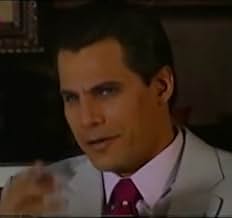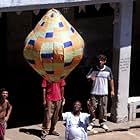The origins of "Decadência" comes from an everlasting rivalry between TV network Globo and Record in being the leader in audience and how Globo felt
as need to cause some damage to the reputation of Record that at time was recently commanded by bishop Edir Macedo and his church, and that network was
becoming a major threat in the ratings. Dias Gomes miniseries tried so hard to not be a direct attack on Macedo's populist tatics but a good observer
(and Record too) easily noticed how critical they were of everything they were doing. But "Decadência" has a higher and far more interesting scope to deal
with. It's the story of a nation going through many major social and political changes used as a background to tell the downfall of an important family
and business dynasty. It's a highly absorbing work with many great things to show and tell.
The Tavares Branco family is highly regarded with their solid business empire that begins to crumble after the patriarch's death (Rubens Correa).
Another turning point to the family comes when Albano Filho (Stênio Garcia) is offered an orphan boy to take care, who grows up and becomes a driver
for the family and he's treated as family by the man's daughters and one of them develops a crush on him. By a twist of unfair events the now teen is kicked
out of the house and he finds some solace after being invited to join an evangelical church. As time moves on, he becomes a self made man (played by Edson
Celulari) who founds his own Neo-charismatic church with his elaborated preachings on the prosperity theology, becoming a phenomenon overnight. With money
and power comes the idealization of giving some dark retribution to the Tavares Branco family, a hard task that almost gets forgotten when he meets again
one of the daughters (Adriana Esteves) his first love.
"Decadência" is one of those long stories that has a bit of everything: power, corruption, sex, addiction, cheating, rebelness, sordid characters and
naive characters. It covers a period going from 1970's to early 1990's making a great and comprehensive paralel with Brazil's reality at those times, from
the military regime when the rich family was living well to the return of democracy and later president Collor impeachment with the "painted faces" taking
over the streets and protesting with energy against the corrupt man. Yet, it's the preacher Mariel that we get most invested with, his schemes to get back
at the family and also his shady schemes inside the church, to the point of commanding an attack to a former colleague (Milton Gonçalves) who was threatning
to expose his wrongdoings and even attempted to kill Mariel on stage during a preaching. It's an obvious exageration if we follow the real man who inspired
the character, but the whole criticism against the church and his way of conducting business and what some say the way they trick their followers was quite
accurate if we consider the news reports made by Globo, which secretly filmed some of the bishop meetings.
It's a very enjoyable piece, slightly melodramatic but it works both as a way to look back at a recent past from Brazil and how society changed
through that 20 year period, and it's also lots of fun to watch for the cast involved. I don't consider Celulari a good actor but he's always a great
on screen presence. This role might be his very best and also his least remembered. He makes of Mariel a character full of energy, charisma and charm
who can easily seduce and trick everyone to get what he wants. Adriana Esteves was a fine companion to him, torn apart between Mariel and her doctor
husband (Raul Gazolla). Cast also includes Ariclê Perez, Maria Padilha (as the alcoholic daughter of the family), Paulo Gorgulho, Paulo José, Cibelle
Larrama, Luiz Fernando Guimarães as a political lobbyst who makes several schemes in Brasília along with Maria Zilda Bethlem character (what a pair they
were), and the always phenomenal Ricardo Blat, playing Mariel's most loyal follower. If there's one terrible wrong cast note comes from the young
Leonardo Biagioni, who plays the rebel son of Padilha's character. I don't know where Globo found this kid but it's certain that they never let him get
back there (or maybe he wasn't so interested on acting). To say he was wooden is a compliment, it's just that bad.
A real pity that this never got a re-run (miniseries hardly ever get those, neither Viva showed it. I saw it through other means) because it was a quite effective and well made project. 9/10.






















